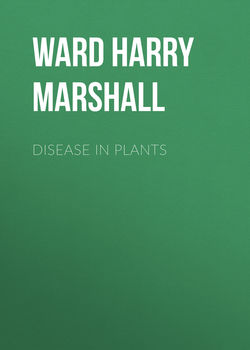Disease in Plants

Реклама. ООО «ЛитРес», ИНН: 7719571260.
Оглавление
Ward Harry Marshall. Disease in Plants
PREFACE
PART I. SOME FACTORS
CHAPTER I. THE PLANT AND ITS SURROUNDINGS
Notes to Chapter I
CHAPTER II. THE PLANT AND ITS FOOD
Notes to Chapter II
CHAPTER III. THE PLANT A LIVING MACHINE
Notes to Chapter III
CHAPTER IV. METABOLISM
Notes to Chapter IV
CHAPTER V. ROOTS AND ROOT-HAIRS
Notes on Chapter V
CHAPTER VI. THE FUNCTIONS OF ROOT-HAIRS
Notes on Chapter VI
CHAPTER VII. THE BIOLOGY OF SOIL
Notes to Chapter VII
CHAPTER VIII. HYBRIDISATION AND SELECTION
Notes To Chapter VIII
PART II. DISEASE IN PLANTS
CHAPTER IX. PHYTOPATHOLOGY. DERIVATION AND MEANING
Notes to Chapter IX
CHAPTER X. HEALTH AND DISEASE
Notes to Chapter X
CHAPTER XI. CAUSES OF DISEASE
Notes to Chapter XI
CHAPTER XII. CAUSES OF DISEASE. THE LIVING ENVIRONMENT
Notes to Chapter XII
CHAPTER XIII. NATURE OF DISEASE
Notes to Chapter XIII
CHAPTER XIV. NATURE OF DISEASE (Continued)
Notes to Chapter XIV
CHAPTER XV. SPREADING OF DISEASE AND EPIDEMICS
Notes to Chapter XV
CHAPTER XVI. THE FACTORS OF AN EPIDEMIC
Notes to Chapter XVI
CHAPTER XVII. REMEDIAL MEASURES
Notes to Chapter XVII
CHAPTER XVIII. VARIATION AND DISEASE
Notes to Chapter XVIII
CHAPTER XIX. SYMPTOMS OF DISEASE
Notes to Chapter XIX
CHAPTER XX. SYMPTOMS OF DISEASE (Continued)
Notes to Chapter XX
CHAPTER XXI. ARTIFICIAL WOUNDS
Notes to Chapter XXI
CHAPTER XXII. NATURAL WOUNDS
Notes to Chapter XXII
CHAPTER XXIII. EXCRESCENCES
Notes to Chapter XXIII
CHAPTER XXIV. EXCRESCENCES (continued)
Notes to Chapter XXIV
CHAPTER XXV. EXUDATIONS AND ROTTING
Notes to Chapter XXV
CHAPTER XXVI. NECROTIC DISEASES
Notes to Chapter XXVI
CHAPTER XXVII. MONSTROSITIES AND MALFORMATIONS
Notes to Chapter XXVII
CHAPTER XXVIII. PROLIFERATIONS
Notes to Chapter XXVIII
CHAPTER XXIX. GRAFTS
Notes to Chapter XXIX
CHAPTER XXX. LIFE AND DEATH
Notes to Chapter XXX
Отрывок из книги
If I were asked to sum up the most important result of the numerous advances made during the past decade in agriculture and forestry, I should reply—the clearer and wider recognition of the fact that the plant itself is the centre of the subject, and not the soil, climate, season, or other factors of its environment. Until comparatively recent times it was the habit of farmers, foresters, planters, and gardeners, all the world over, to look upon the plant as a mere item or as a mysterious if important one in their calculations, and to regard the soil as the chief factor in their studies.
Now all is changing, and the world is gradually awakening more and more to the recognition of the truth that the soil and the clouds and the atmosphere are merely reservoirs of more or less inert materials, from which the living plant draws its supplies, and works them up, by means of energy focussed from the sun, into new plant substance.
.....
But this does not give us any definite idea of the length of the cylinders of soil explored by these surfaces, until we find that plants such as an ordinary sunflower, hemp, or vegetable-marrow may have roots penetrating into a cubic meter of soil, in all directions, and so closely that probably no volume so large as a cubic centimeter is left unexplored. Clark found by actual measurement that the roots of a large gourd, if put end to end, extended over 25 kilometers, and Nobbe gives 520 meters for the roots of a wheat. Vetches may go nine feet deep, and oats more than three feet. The Sal, a tree of the forests of India, has roots which penetrate to a depth of 50 to 60 feet.
Some rough notion of the lengths, superficies and penetrating capacities of the roots of a large tree may be gathered from the above, but it is doubtful whether we can form any adequate ideas as to the millions of root-hairs which must be developed along the course of these subterranean boring organs.
.....